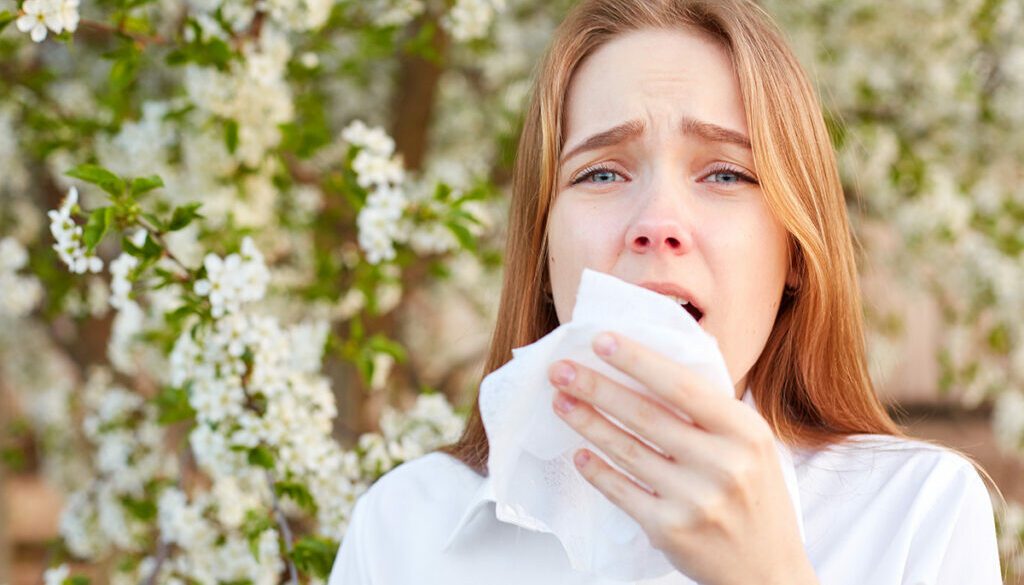Take Control of Your Seasonal Allergies
Spring is upon us and with the return of warmer weather and longer days, we are looking forward to spending more time outside. But those of us who suffer from seasonal allergies may be worried about the symptoms that can be triggered by various elements of the outdoors. Dr. Christian Whittington with CMC Primary Care on Highway 90 provided an overview of what happens when we breathe in outdoor allergens and what we can do to treat the symptoms that occur.
Common seasonal allergies
The most common seasonal allergen is pollen. “It’s what comes to mind first when you think of springtime allergies,” said Dr. Whittington. “During the season, these tiny particles are produced by trees and plants. The yellow pollen that comes from trees is a visual alert that all the other problematic pollen from grasses, weeds, and other plants are germinating. And all of these types of pollen are easily windblown, so we breathe these in and that’s where our problems begin.”
In addition to pollen, other outdoor elements can trigger allergies. “During this time of year, we’re going to want to enjoy the beautiful weather that Myrtle Beach has to offer but some of the fun things we like to do can also affect our allergies,” Dr. Whittington noted. “The smoke from our grills when we have a BBQ, as well as the chlorine in pools, can trigger allergies. Bugs are prevalent this time of year so we’re at risk of insect bites and stings which can also cause allergic reactions.”
Know the symptoms
Many of the symptoms of seasonal allergies are not very hard to spot. “Around the time we start seeing yellow pollen, the most common symptoms a person will experience are sneezing, sinus congestion, runny nose, coughing, and itchy, watery eyes,” explained Dr. Whittington. “Our immune systems perceive pollen as an intruder and our bodies try to defend themselves by releasing histamines and other chemicals. These defense mechanisms actually cause a majority of the symptoms we end up experiencing.”
Symptoms can worsen for various reasons. For instance, if the pollen count gets higher, it could increase the irritating effects of your body’s response. If you spend more time outdoors, it can also intensify your reactions because your exposure is increased.
Accepting New Patients at
CMC Primary Care – Hwy 90
Christian Whittington, MD
How to control your seasonal allergies
There is no cure for seasonal allergies, however, Dr. Whittington highlighted several treatments and things you can do to control and prevent your symptoms.
“Preventative measures you can take to avoid exposure are things like keeping your doors and windows closed as much as possible,” said Dr. Whittington. “Don’t drive with your windows down and minimize your time outside where you have direct exposure to the irritants in the air. When mowing your yard wear a mask or have someone else do it for you. And monitor pollen counts whether it’s here at home or if you’re going out of town.”
More than likely, total avoidance of pollen is impossible as the threat can continue well into the summer. For those suffering from allergies, there are many treatment options that your physician can walk you through.
“There are several antihistamines on the market that help target the symptoms like sneezing and nasal drip that are caused by the immune system’s response to allergens,” detailed Dr. Whittington. “A decongestant is also something you can get over the counter that will help ease congestion and sinus pressure. The other thing you can do for nasal congestion and irritation is to use a nasal spray or a neti pot to help flush your sinuses. And, of course, eye drops will help ease those red, itchy, irritated eyes.”
Dr. Whittington stressed the importance of being proactive and consistent with your allergy medications. “Early treatment is key in not letting allergies take over your life during the peak season. You don’t want to wait until the pollen is falling and covering your car or when you are already sneezing and feeling like you are under attack. You want to start taking those allergy medications now and get in with your physician so they can coach you on how to prevent your allergies from flaring up so badly. There are many new treatments out there that can be combined to better control your symptoms.”
If you suffer from severe allergies every year, some long-term treatments may help. “Prescription nasal sprays have an added layer of defense,” explained Dr. Whittington. “They contain steroids that can decrease the swelling in your nose and sinuses which will help you breathe easier. There are also allergen immunotherapy shots that can be administered weekly in your doctor’s office that will greatly reduce your chances of having allergic reactions. There are also versions of this in pill and drop form and they all work by gradually exposing your system to the offending allergens and desensitizing your system to them.”
Take control of your allergy symptoms
There is no reason to suffer from seasonal allergies this spring and summer. Dr. Christian Whittington and his team at CMC Primary Care on Highway 90 can help you feel better and even prevent symptoms from occurring in the first place. Take control of your allergies and better enjoy all that Conway and Myrtle Beach have to offer when the sun is shining and the weather is fine.





